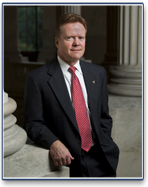Conventional wisdom holds that John McCain is struggling to win evangelical voters. Evangelical leader Mark DeMoss predicted last week that he’d run weaker than any Republican since 1976, and a front page New York Times piece detailed the evangelical malaise.
Sen. McCain has been criticized by prominent Christian leaders such as James Dobson, who said at one point he might even stay home instead of supporting someone as repulsive as Sen. McCain. They view him as insufficiently conservative and still fume over his comments in 2000 that some religious conservative leaders were “agents of intolerance.” In the primaries, most Christian leaders backed Mitt Romney or Mike Huckabee. More recently, Sen. McCain’s decision to jettison two prominent conservative Christians – John Hagee and Rod Parsely – has sent his God-o-Meter ratings plummeting like a stone in a baptismal font.
On the contrary, Sen. McCain won the nomination in part because he did far better than expected with rank-and-file evangelicals.
For instance, in New Hampshire, among the 21% of the Republican electorate that was evangelical or “born again,” Sen. McCain won 29%, Mr. Romney 28% and Mr. Huckabee 27% — even though Mr. Huckabee is a former evangelical preacher and Mr. Romney had the endorsements of many key Christian leaders.
In Texas, where half the primary voters described themselves as evangelical, Sen. McCain won 44% of them, while Mr. Huckabee got 48%. And in Florida, the decisive state that clinched the nomination for Sen. McCain, he once again played to a tie among evangelicals (Mr. Huckabee 31%, Mr. Romney 31%, Sen. McCain 28%.) Not too shabby for someone supposedly viewed as just one step above Sen. Lucifer.
Where he does have trouble is among Southern evangelicals; in South Carolina, for instance, Mr. Huckabee won 43% and Sen. McCain 27%, though even here he beat Fred Thompson and Mr. Romney, both candidates supposed to do much better than Sen. McCain among evangelicals.
In a recent Rasmussen poll, Sen. McCain was winning 58% of evangelicals, and his Democratic rival, Sen. Barack Obama, was winning 32%.
Why would Sen. McCain be doing so much better among evangelical voters than evangelical leaders?
First, the leadership’s disgust with Sen. McCain stems from the candidate’s treatment of them. His “agents of intolerance” speech was not an attack on evangelicals, but on a few of their leaders.
Second, some of the issues over which Christian leaders have chastised Sen. McCain are inside-the-beltway concerns that don’t resonate with rank-and-file voters. For instance, Christian leaders often cite Sen. McCain’s authorship of campaign finance legislation that they believe would restrict their lobbying and advocacy abilities. Most voters care little about this issue.
Third, though he’s reluctant to talk about his personal faith, in many ways Sen. McCain is substantively in perfect alignment with today’s evangelical voters. They tend to be conservative but have veered from the religious right on a few issues, one of which is climate change – the exact issue that Sen. McCain has highlighted as his point of departure with Republican orthodoxy.
Fourth, Sen. McCain’s support of the Iraq war, his war-hero history and his emphasis on fighting terrorism appeals to those Christians who feel that fighting Islam has risen to the top of the list of important issues for Christians. For many Christians, Islamofascism is the new “gay marriage.”
Is he as beloved among evangelicals as President Bush was? No. Does Sen. Obama have a shot at winning a bulk of them? Yes. But Sen. McCain’s problems with rank-and-file evangelical voters have been vastly overstated.
Republished from The Wall Street Journal Online

